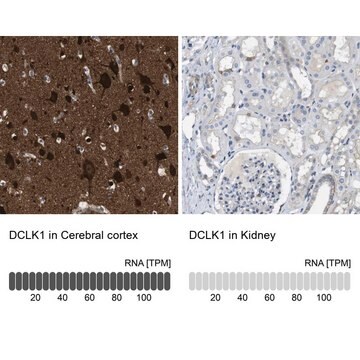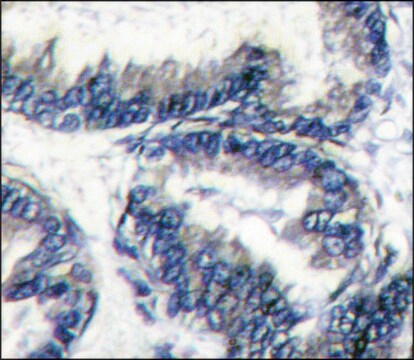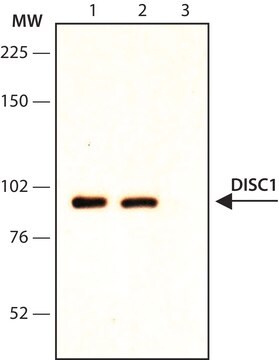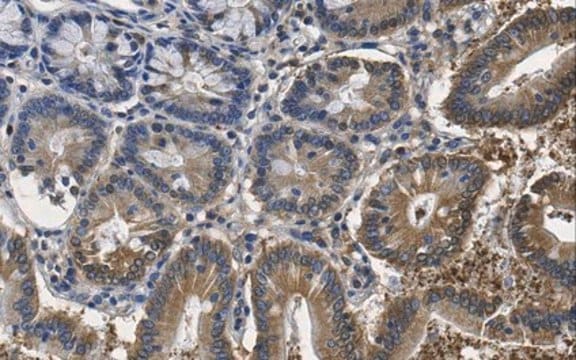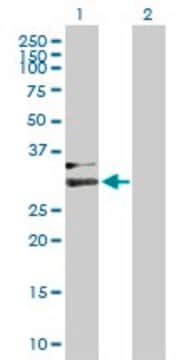추천 제품
생물학적 소스
rabbit
결합
unconjugated
항체 형태
affinity isolated antibody
항체 생산 유형
primary antibodies
클론
polyclonal
형태
buffered aqueous solution
분자량
~81 kDa
종 반응성
rat, mouse, human
향상된 검증
recombinant expression
Learn more about Antibody Enhanced Validation
농도
~1.5 mg/mL
기술
western blot: 1.5-3.0 μg/mL using extracts of postnatal mouse brain (S1 fraction), postnatal rat brain (S1 fraction) and of HEK-293T cells over-expressing human DCLK1
UniProt 수납 번호
배송 상태
dry ice
저장 온도
−20°C
타겟 번역 후 변형
unmodified
유전자 정보
human ... DCLK1(9201)
mouse ... Dclk1(13175)
rat ... Dclk1(83825)
일반 설명
Anti-DCLK1 is produced in rabbit using as immunogen a synthetic peptide corresponding to human DCLK1, conjugated to KLH. DCLK1 (doublecortin like kinase 1) is also known as DCLK, DCAMKL1, DCDC3A and CLICK1. DCLK1 consists of an N-terminal doublecortin (DC) domain, responsible for its localization to microtubules and a C-terminal Ser/Thr kinase domain.
DCLK1 is a neuronal transmembrane enzyme that may regulate cortical development, nerve cell migration and microtubule polymerization. This enzyme is similar to DCX, but DCLK1 additionally functions as a Ca2+/calmodulin-dependent protein kinase that can phosphorylate myelin basic protein and itself . Anti-DCLK1 antibody is specific for human, rat and mouse DCLK1. In immunoblotting, detection of the DCLK1 band is specifically inhibited by the DCLK1 immunizing peptide.
면역원
The corresponding sequence is highly conserved (single amino acid substitution) in rat and mouse DCLK1.
애플리케이션
Anti-DCLK1 antibody is suitable for use in western blot (1.5-3.0 μg/mL using extracts of postnatal mouse brain (S1 fraction), postnatal rat brain (S1 fraction) and HEK-293T cells over-expressing human DCLK1). The antibody may also be used for immunoblot (approx. 81 kDa) assays.
생화학적/생리학적 작용
Doublecortin-like kinase1 (DCLK1) is widely expressed in post-mitotic neurons in the developing nervous system and important for neuronal migration to cerebral cortex. DCLK1 is highly expressed during embryogenesis and is localized to neuronal growth cones where it associates with the microtubule cytoskeleton and regulates microtubule polymerization. DCLK1 kinase domain is susceptible to cleavage by the Ca2+ -dependent protease calpain, suggesting that a Ca2+ -responsive mechanism is involved in regulating the DCLK1 kinase activity during embryogenesis. DCLK1 has been identified as a putative intestinal stem cell marker.
물리적 형태
Solution in 0.01 M phosphate buffered saline, pH 7.4, containing 15 mM sodium azide
면책조항
Unless otherwise stated in our catalog or other company documentation accompanying the product(s), our products are intended for research use only and are not to be used for any other purpose, which includes but is not limited to, unauthorized commercial uses, in vitro diagnostic uses, ex vivo or in vivo therapeutic uses or any type of consumption or application to humans or animals.
Not finding the right product?
Try our 제품 선택기 도구.
Storage Class Code
10 - Combustible liquids
Flash Point (°F)
Not applicable
Flash Point (°C)
Not applicable
시험 성적서(COA)
제품의 로트/배치 번호를 입력하여 시험 성적서(COA)을 검색하십시오. 로트 및 배치 번호는 제품 라벨에 있는 ‘로트’ 또는 ‘배치’라는 용어 뒤에서 찾을 수 있습니다.
Alternative transcripts of Dclk1 and Dclk2 and their expression in doublecortin knockout mice
Tuy F P D, wt al.
Developmental Neuroscience, 30(1-3), 171-186 (2008)
Cleavage of Doublecortin-like Kinase by Calpain Releases an Active Kinase Fragment from a Microtubule Anchorage Domain
Burgess H A and Reiner O
The Journal of biological chemistry, 276(39), 36397-36403 (2001)
Expression, characterization, and gene knockdown of zebrafish doublecortin-like protein kinase
Shimomura S, et al.
Archives of Biochemistry and Biophysics, 463(2), 218-230 (2007)
Prabhu Ramamoorthy et al.
Biomedicines, 9(5) (2021-05-01)
Triple negative breast cancer (TNBC) is observed in ~15% of breast cancers and results in poor survival and increased distant metastases. Within the tumor are present a small portion of cancer stem cells that drive tumorigenesis and metastasis. In this
DCAMKL1 encodes a protein kinase with homology to doublecortin that regulates microtubule polymerization
Lin P T, et al.
The Journal of Neuroscience, 20(24), 9152-9161 (2000)
자사의 과학자팀은 생명 과학, 재료 과학, 화학 합성, 크로마토그래피, 분석 및 기타 많은 영역을 포함한 모든 과학 분야에 경험이 있습니다..
고객지원팀으로 연락바랍니다.
